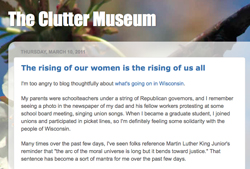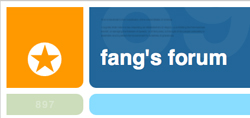(This is another über-post. I’ve been feeling some bloggers’ block lately, and this is my attempt to just get The Big Issues out there so I can refocus.)
Since I came to Boise, I have thrived professionally. (This isn’t to say that I’ve garnered major grants or become a publishing machine, but I’m establishing a strong foundation for whatever comes next. My departmental mentoring committee has assured me that I’ve checked all the key boxes for tenure, though I still have two years left on that clock.)
I can attribute this phenomenon primarily to a few things:
- A clean slate: I tend to do well with a fresh start; I step up to new challenges. And switching disciplines (from cultural studies → history) while also starting out on the tenure track has been, well, both mind-boggling and fun.
- Supportive colleagues: my department is ridiculously collegial. My colleagues are open to my crazy ideas and have encouraged an attitude I might describe as “entrepreneurial.”
- A spouse who is, for too many reasons to list, the best possible dad to Lucas.
- My (often naïve) fearlessness in speaking my mind, particularly when it comes to technology. (Maybe more on this in a future blog post. . .)
I am grateful the stars have aligned in such a way. I’m involved in all kinds of interesting collaborations and initiatives. If everything continues as it is now, I’d be content to spend the rest of my career here.
Except.
(You knew there was a “but” coming, yes?)
The people I brought with me to Boise are, for reasons I won’t go into here but which aren’t of their own making, not thriving to the same extent I am. It’s becoming ever clearer that it might be beneficial for us (all of us, not just Fang and Lucas) to be closer to family, which ideally means Southern California, where just about all my family lives in the same zip code, and where a pillar of Fang’s family also resides.
Am I actively searching for a job? Did I even look at the academic job listings this fall? Have I applied for any jobs? No.
Consider this post a me-putting-it-out-there-to-the-universe that within the next 5-7 years I might like to relocate. I have some projects I want to finish, or at least see take on lives of their own, and Lucas has expressed a desire to move to California when he’s finished at his current school. (Is this an announcement that I’m leaving Boise State? Not at all. In fact, it’s unlikely I will, as no one in my department has left eagerly (retirees possibly excepted) in living memory. Still, I’m open to change.)
Pivoting
I landed on the tenure track at a pivotal moment in higher education–by which I mean that I can see many universities, including my institution, beginning to pivot away from an instructional and academic model that interests me to one that decidedly doesn’t. I feel compelled to stay long enough to discourage such pivoting–or, rather, to encourage the institution to pursue a smarter trajectory.
For example, there’s something chafing about being in a college of social sciences at a moment of where the larger university is emphasizing analytics. Suddenly we’re having to input all our faculty activities into a database that–because it’s called “Digital Measures”–I suspect has some kind of algorithm, programmed by the university, that spits out a quantitative assessment of faculty work. As a humanist, this is problematic on a number of levels–first, as a junior faculty member doing unconventional work, my efforts are especially resistant to quantification. I’m having a hell of a time fitting my work into any of the drop-down categories, and I don’t know how to handle the first/second/third author thing on conference panels where everyone contributes equally. Second, and perhaps more obviously, I have a deep-seated philosophical resistance to such quantifying measures, a resistance that goes way beyond my own puzzling situation.
On the instructional side of this pivot, I’m skeptical, nay critical, of MOOCs—or of any online instructional model that assumes students should sit through lectures to learn content that can be tested using multiple-choice exams. Universities seeking to scale the delivery of content are headed in the wrong direction; they should be looking instead to both broaden and deepen student participation in critical and creative thinking. Massive courses, especially those driven by students’ content mastery, are not the way to cultivate an intelligent and engaged citizenry.
Which brings me to a related point. . .
Being a public historian in the academy is a sticky wicket
I have launched myself into a paradoxical career space. I was hired as a public historian, although I wouldn’t necessarily have considered myself one of that species prior to my arrival here. The further I explore public history theory and practice, the more I find myself emphasizing a vision of historical practice that pretty much goes against what typically happens in academic history, which suggests maybe the academy isn’t the best place for me, philosophically, though it certain is the best place for me temperamentally. (Again, a subject for another post.) In brief, I believe that we’re at a technological and cultural moment when it’s silly to continue teaching (in K-16) the same sweeping courses (the Pleistocene to 1877 survey, for example), and that it’s more important to teach students to be thoughtful citizens of the republic–by which I mean that we should be having students do considerably more primary source discovery and interpretation than I’ve seen in the classroom (here and elsewhere). (I’ve heard a lot of lip service paid to such pedagogical practice, but have observed insufficient implementation.)
We should be emphasizing the necessity not of knowing history well, but of doing history well. For me, “public history” comprises not merely history undertaken by professional historians for a public audience, but rather the ways the public undertakes and understands history. With such a perspective, it’s kind of a no-brainer that I need to teach my students how to do history well–which means more that content mastery or writing a good essay in response to texts we have read in class.
I have colleagues (and readers, I’m certain) who believe doing history well means having a foundation in the facts (for example, the canonical history portrayed in U.S. history survey textbooks). I have to ask: How’s that model been working out over the past century or so, in terms of the historical and scientific literacy of the American public?
I want to be part of an educational solution, and I’m not certain I can do that most effectively from within the undergraduate (or graduate) history classroom.
My own pivoting (or, too damn many paths before me)
One of my favorite career-finding books, and one I recommend regularly to my students, is Barbara Sher’s Refuse to Choose. In it, she describes “scanners,” bright people who are simultaneously and/or serially interested in diverse and sometimes divergent subjects and careers. She categorizes scanners according to their intellectual and behavioral patterns, then details the possibilities and pitfalls that accompany life as a scanner. As someone with an M.A. in writing poetry, a Ph.D. in cultural studies, a tenure-track position in a history department, and a professional background that is a crazy quilt of journalism, educational publishing, arts marketing, development communications, hands-on science learning, exhibition development, museum studies, academic technology, and higher ed pedagogy, I definitely identify with Sher’s taxonomy of scanners. I see many paths available to me, as an academic, employee, or entrepreneur.
Instead of being excited, however, I feel stuck. That’s largely because financially, moving to Boise was a mistake. Not only did I take a big salary hit that wasn’t offset by a diminished cost of living, but Fang also had his hours cut and had to become an independent contractor instead of an employee, which means he both took a pay cut and has to pay self-employment taxes. We’ve been dipping into our meager reserves more regularly than I’m comfortable admitting. I’m very conscious, then, that my next move must be financially remunerative in a big way.
That stuckness also comes from being overcommitted (as academics are wont to be, but I’m perhaps more entangled in projects and programs than is considered normal in these parts). It means I don’t have a lot of spare time to explore reasonable new paths. I hereby declare 2013, then, as the Year of Letting Things Go.
Unfortunately, “letting things go” doesn’t mean just kicking back–in fact, at first it might mean kicking everything up a notch. So, what might “letting things go” look like for me?
- Relinquishing responsibility for or participation in projects and programs that aren’t benefiting significantly from my participation.
- Saying no to most invitations to contribute or collaborate, even though that might mean not extending my network as broadly or deeply as I’d like.
- Recommitting to, or doubling down on, projects to see them finished up or launched into other hands. (I’m looking at you, Boise Wiki.)
- Getting those various half-finished articles out the door.
- Helping Fang get to a point in his in-progress and proposed projects so that he feels confident carrying them forward.
- Handing off potential projects and collaborations to grad students to use as their Master’s theses or projects.
- Hiring and mentoring interns to tackle things that would help them to develop key skills (e.g., writing for a public audience, archival research, technological savvy).
What are the benefits of letting things go by reinvesting in these projects before divesting myself of them?
- Seeing my little projects and programs out thriving on their own will give me a sense of satisfaction and raise my profile locally and in the field.
- Clearing brain space for more strategic thinking about with what kinds of projects and programs I become involved.
- Allowing more time for my extracurricular writing, including blogging and those essays I’ve been wanting to write.
- A small corps of undergraduate digital history interns tested and trained by me before they apply (as they tend to do) to our public history M.A.
- I can focus on projects that, assuming I navigate the university’s sponsored projects and intellectual property officers correctly, might actually bring in a little additional income.
What about you, readers and friends? What’s keeping you occupied these days, and what are your plans for moving forward, in 2013 and beyond?

